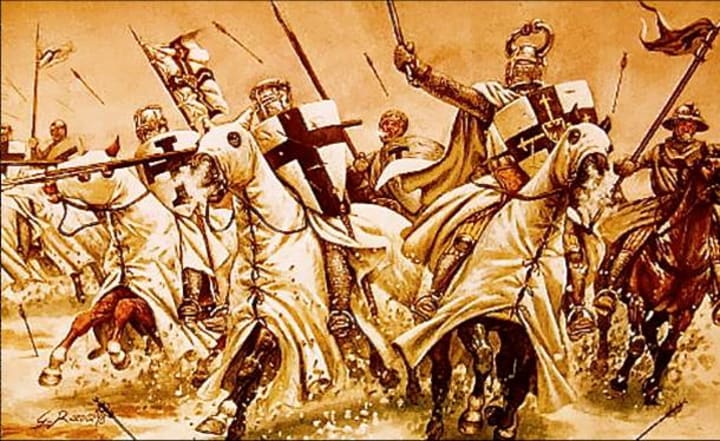The Crusades: A Confluence of Faith, Power, and Conflict
Unraveling the Complex Tapestry of Medieval Holy Wars

The Crusades stand as one of the most intriguing and consequential chapters in the annals of history, entwining religion, politics, and warfare into a complex tapestry. Spanning several centuries, these holy wars reverberated across Europe, Asia, and the Middle East, leaving an indelible mark on the cultural, political, and religious landscapes of the world. This article delves into the multifaceted saga of the Crusades, exploring the origins, motivations, key players, and lasting impact of these epochal conflicts.
I. The Origins and Motivations of the Crusades:
The roots of the Crusades can be traced back to the 11th century, primarily ignited by religious fervor and the desire to reclaim the Holy Land from the hands of the Muslims. At the heart of the Crusades lay Jerusalem, the holy city of Christians, Jews, and Muslims alike. For the Christian world, capturing Jerusalem held profound spiritual significance, and this fervent aspiration galvanized the call for armed expeditions.
Pope Urban II's seminal sermon at the Council of Clermont in 1095 is often regarded as the official inception of the Crusades. His impassioned plea urged Christian knights and warriors to embark on a sacred pilgrimage to liberate Jerusalem. In return for their service, participants were promised the remission of sins and eternal salvation, enticing thousands to take up the cross and venture into unfamiliar lands.
II. The Crusader States and their Impact:
The First Crusade, launched in 1096, saw the establishment of several Crusader states in the Levant, such as the Kingdom of Jerusalem, the Principality of Antioch, and the County of Tripoli. These states became a unique blend of Western and Eastern cultures, influencing the arts, architecture, and governance in the region. The Crusader states, however, were consistently under threat from Muslim forces, and a series of subsequent Crusades were initiated to protect and expand their territories.
III. Clash of Civilizations: Christians vs. Muslims:
The Crusades witnessed a prolonged clash between the Christian and Muslim worlds. This confrontation was not merely a religious conflict but also a collision of cultures, ideologies, and power. The Muslims, led by renowned military commanders like Saladin, fiercely defended their territories, creating a formidable adversary for the Crusaders.
The Third Crusade, led by Richard the Lionheart of England, is particularly noteworthy. Though it failed to recapture Jerusalem, it showcased the diplomacy and military prowess of the European leaders while establishing a fragile truce with the Muslim rulers.
IV. The Sacking of Constantinople: The Fourth Crusade:
One of the most controversial episodes of the Crusades was the Fourth Crusade. In an unexpected turn of events, the Crusaders, instead of reaching the Holy Land, diverted their attention to Constantinople, the capital of the Byzantine Empire. In 1204, they laid siege to the city and ultimately captured it, leading to the tragic sack of Constantinople, resulting in the division and weakening of the Eastern Christian and Orthodox world.
V. The Decline of the Crusades and Legacy:
Over time, the fervor and enthusiasm that once fueled the Crusades dwindled. Geopolitical factors, internal divisions, and the rise of powerful Muslim leaders gradually diminished European interest in pursuing the holy wars. The failure of subsequent Crusades weakened the Christian presence in the Levant, leading to the eventual collapse of the Crusader states by the end of the 13th century.

Nevertheless, the Crusades left an enduring imprint on history. They facilitated the exchange of knowledge and cultures between East and West, contributing to the European Renaissance. The Crusades also shaped the perception of the "Other" and reinforced stereotypes between Christians and Muslims, leaving a legacy that continues to reverberate in contemporary times.
The Crusades remain an intricate tapestry of faith, power, and conflict that profoundly influenced the course of history. These holy wars, driven by religious zeal, geopolitical ambitions, and cultural differences, shaped the destiny of nations and civilizations. The Crusades serve as a reminder of the complexities of human nature and the enduring impact of religious fervor on the world stage. As we study and reflect on this tumultuous period, we must strive to understand the lessons of the past and work towards a future built on tolerance, understanding, and mutual respect.
About the Creator
Enjoyed the story? Support the Creator.
Subscribe for free to receive all their stories in your feed. You could also pledge your support or give them a one-off tip, letting them know you appreciate their work.






Comments
There are no comments for this story
Be the first to respond and start the conversation.